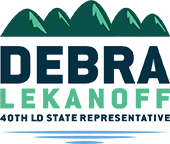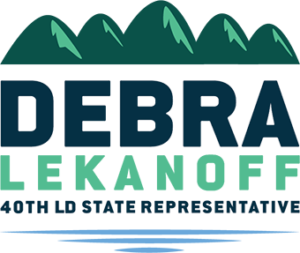Uplifting Our Youth on Fantastic Friday!
Dear Friends,
As autumn’s vibrant hues begin to adorn our landscape, I extend a warm welcome to all students returning to our educational institutions and those embarking on new apprenticeship programs. This academic year presents a fresh opportunity for growth, learning, and preparation for a promising future.
Our K-12 schools across Skagit, Whatcom, and San Juan counties are eagerly anticipating the return of approximately 22,000 students. Skagit County leads with about 13,500 students, followed by Whatcom County with 9,000, and the San Juan Islands with 1,500. From kindergarteners taking their first steps into formal education to high school seniors tackling advanced coursework, this year brims with potential. I commend our educators and staff for their unwavering dedication to creating nurturing and inspiring learning environments.

Bellingham High School
Our community colleges continue to serve as crucial gateways to higher education and vocational training. Skagit Valley College expects to welcome over 5,000 students, while Whatcom Community College and Bellingham Technical College will serve about 4,200 students combined. San Juan College will provide valuable community and technical education to approximately 100 students. I encourage all students to fully utilize the resources available, including academic advising, tutoring services, and networking opportunities with local businesses.
For those pursuing higher education at our state universities, we proudly send approximately 3,500 students from our district to campuses across Washington. Western Washington University alone will host about 15,000 students this year. As many transition back to in-person learning, we celebrate the diverse talents and perspectives these students bring to their campuses. I urge all university students to actively engage in campus life, join clubs, and seek internships to enrich their educational experience.

Western Washington University
To those entering apprenticeship programs, I offer my heartfelt support. These programs provide an invaluable blend of hands-on learning and practical experience, paving the way for rewarding careers. The growing number of local apprenticeship opportunities underscores our commitment to preparing the next generation for success in various trades and professions.
As we begin this promising new school year, let us collectively commit to fostering an environment of learning, support, and community. Education is not merely about imparting knowledge; it’s about nurturing curiosity, fostering collaboration, and equipping young minds to address future challenges.
To every student in the 40th Legislative District, I wish you a successful and fulfilling 2024-2025 academic year. Approach your educational journey with enthusiasm and determination, knowing that our entire community stands ready to support your path to success. Here’s to a year brimming with discovery, achievement, and inspiration!
Keep reading for more on this Fantastic Friday.
Rep. Debra Lekanoff
The Mount Vernon Chamber of Commerce Latino Youth Business Program
Congratulations to the remarkable youth who participated in the Latino Business Youth Program with the Mount Vernon Chamber of Commerce and Triumph Teen Center! This initiative is cultivating future leaders by equipping them with the tools, knowledge, and mentorship necessary for success in the business world.
Recently, the program gathered aspiring young entrepreneurs to learn from my esteemed colleague Marco Morales, who delivered an inspiring presentation on Identity and Culture, emphasizing the rich history of our Latino community in the Skagit Valley. Participants also had the chance to hear from other distinguished speakers and were paired with business mentors to guide them on their entrepreneurial journeys. Kudos to the Chamber and Triumph Teen Center for their commitment to empowering our community’s future leaders!

Marco Morales and Youth Cohort, credits MM
If you are part of the Latino community and aged 16-24, I encourage you to join the Latino Business Youth Program, a FREE comprehensive business training initiative designed to equip young entrepreneurs with essential skills for starting and growing their own businesses. Facilitated by the Mount Vernon Chamber of Commerce Foundation, this program aims to enhance the participation and success of Latino youth entrepreneurs in our region.
Participants who complete the program will gain valuable knowledge, mentorship, and access to employment opportunities. This initiative represents a significant step forward in creating opportunities for young Latino entrepreneurs and fostering a vibrant economic future for the Skagit Valley.
On behalf of the 40th Legislative District, we are immensely proud of our youth, their mentors, and the entire Latino community for uniting to build a strong foundation for future generations.
For more information, click here.
A Legacy of Inclusivity, Innovation, and Honoring Indigenous Heritage
Western Washington University (WWU) has undergone a remarkable transformation since its inception in 1893 as New Whatcom State Normal School. Today, WWU stands as a leading public university serving over 16,000 students, with nearly 30% identifying as people of color, reflecting its commitment to inclusivity and diversity.
Recent campus developments, supported by state funding and private contributions, showcase WWU’s dedication to innovation and sustainability. The Kaiser Borsari Hall, Washington State’s first zero-energy academic building on a university campus, will house electrical engineering and computer science programs. Additionally, the new Interdisciplinary Science Building will address the growing demand for STEM education, while Alma Clark Glass Hall, named after WWU’s first Black student, exemplifies the university’s focus on accessibility and inclusion.

A rendering of Kaiser Borsari Hall
WWU’s collaboration with Washington’s Indigenous communities further demonstrates its commitment to inclusivity. The university has partnered with Coast Salish tribes to construct the House of Healing, a traditional longhouse set to open in 2025. This $4.5 million project, funded by state contributions and local tribes, will provide a cultural and educational space for Native American students, faculty, and the community.
The story of Raven Borsey, a member of the Lummi Nation recently honored for excellence in cultural anthropology, exemplifies WWU’s inclusive mission. Raven’s journey highlights the importance of community support and mentorship, echoing the motto: “It takes a community to raise a child”. His work with Children of the Setting Sun and contributions to cultural and educational programs reflect WWU’s commitment to community leadership and cultural preservation.

Linden Tribune: Earlier this year, Western Washington University’s department of anthropology gave Raven Borsey, pictured, its outstanding graduate award for excellence in cultural anthropology. (Courtesy photo)
As WWU continues to grow and evolve, it remains dedicated to providing a strong, inclusive educational environment. The university’s ongoing efforts to create diverse, sustainable, and innovative learning spaces ensure its position as a leader in shaping the future of education for all students in Washington State and beyond
Using Artificial Intelligence to Explore, Discover, and Understand
On September 25, 2024, the Washington State Academy of Sciences (WSAS) hosted its 17th annual symposium at The Museum of Flight in Seattle, titled “AI for Washington State: Using Artificial Intelligence to Explore, Discover, and Understand.” This event brought together scientists, industry professionals, policymakers, and the public to discuss the impact of Artificial Intelligence (AI) across various sectors, including research, education, and healthcare.
The WSAS, established to provide expert advice to policymakers and the public, gathered leading scientists, researchers, and educators to address critical issues facing Washington and promote the value of science in decision-making. We extended our gratitude to former Governor Christine Gregoire for her leadership in establishing the Academy into law, fostering a collaborative environment for scientific inquiry and innovation.

The symposium explored AI’s potential to transform industries while addressing concerns such as privacy risks, lack of transparency, and increased inequality. Attendees discussed how AI could enhance research and inform decision-making in critical state industries like climate policy, agriculture, and healthcare.
The event featured several highlights:
-
Keynote Speeches: Renowned experts in AI delivered keynote presentations focused on the latest advancements in AI technology and its implications for various sectors.
-
Panel Discussions: Interactive panels with government officials, researchers, and industry leaders explored specific applications of AI in Washington State, including its role in improving climate resilience, optimizing agricultural practices, and enhancing healthcare services.
-
Workshops: Hands-on workshops equipped attendees with practical knowledge on implementing AI solutions in their respective fields. Topics included ethical AI, responsible data usage, and AI in public policy.
-
Networking Opportunities: Attendees had the chance to connect with other professionals in the AI and research communities, fostering collaboration and partnership opportunities.
-
Exhibitor Showcase: A showcase featured AI-related projects and innovations from universities and startups within Washington State.
In recent years, I had the honor of working with Representatives Clyde Shavers, Cindy Ryu, Vandana Slatter, and Senator Joe Nguyen on several key legislative measures addressing the evolving landscape of AI:
-
HB 2165 – Establishing a Framework for AI Regulation: This bill outlined the creation of a regulatory framework to oversee the development and deployment of AI technologies while ensuring that ethical standards were maintained.
-
SB 5035 – Funding for AI Research Initiatives: A budget item was adopted to allocate funds specifically for AI research in state universities to foster innovation and attract talent in the field.
-
HB 1901 – Promoting Workforce Development in AI: This legislation focused on training and education programs to prepare the workforce for AI-related jobs, ensuring that Washington State remained competitive in the rapidly evolving tech landscape.
At the federal level, 2024 saw significant activity aimed at establishing a national framework for responsible AI governance. Notable bills included:
-
The Artificial Intelligence Risk Management Act (AIRMA): This proposed legislation aimed to create a framework for risk management in AI deployment, focusing on public safety and ethical considerations.
-
The National AI Initiative Act Amendments: This legislation expanded upon existing national initiatives to improve coordination across federal agencies concerning AI research and applications while emphasizing collaboration with state and local governments.
-
The AI Accountability Act: This act aimed to establish accountability measures for AI systems, including transparency requirements and standards for data usage.
The legislative actions at both state and national levels reflected a growing recognition of the need for a comprehensive approach to AI governance. The symposium served as an essential forum for discussing the implications of these legislative actions and exploring how they could be leveraged to maximize the benefits of AI in our communities. With participation from members of the research and AI communities, elected officials, and state decision-makers, we anticipated engaging conversations highlighting the importance of collaboration in navigating the complexities of AI.
Attendance was open to all interested parties, offering a unique opportunity for networking and idea exchange among those involved in Washington State’s AI landscape. By coming together, we worked towards a future where AI was utilized not only to drive innovation but also to address and mitigate the challenges that accompanied its swift advancement. The symposium proved to be an amazing day focused on listening to discussions about exploring the potential of AI while ensuring that Washington State harnessed this technology effectively and responsibly.
The Case for Enhanced Funding in Washington State Higher Education
As Washington State navigated the complexities of the economic landscape, one pressing issue stood out: the urgent need to bolster funding for youth pursuing higher education. The cost of college had skyrocketed in recent years, leading many students to graduate with crippling debt that often exceeded $100,000 for undergraduate degrees and even higher for master’s programs. This financial burden stifled their potential, limited their career choices, and hampered the state’s economic growth.
Washington State made commendable strides toward supporting low-income students. Senator Drew Hansen, in his past elected position in the House of Representatives, played a pivotal role in introducing legislation, specifically ESHB 1134, to expand scholarship opportunities for low-income students. This bill aimed to enhance funding for students whose family income was less than $70,000, as well as those earning up to $90,000. This initiative focused on expanding access to higher education for more families and alleviating the financial burdens that often deterred talented young individuals from pursuing their degrees.
Another significant area of concern was support for homeless students pursuing higher education. Representative Debra Entenman from the 47th LD was a strong advocate for these students and effectively promoted programs like the Student Navigator Program, which was supported by ESHB 1250. This initiative aided homeless students in navigating the complexities of college life by providing critical resources and support.
Addressing the issue of housing was another critical area championed by Washington legislators. Vandana Slatter, a member of the Washington House of Representatives, focused her efforts on improving housing availability for students, particularly at Bellevue College. Slatter’s advocacy included proposals for establishing affordable student housing options, recognizing that stable housing was critical for academic success, especially in areas with a high cost of living.
The issue of homelessness among college students was alarming. According to recent studies, upwards of 14% of college students experienced homelessness at some point during their college career. This staggering statistic highlighted the urgent need for targeted support systems within higher education institutions.
Legislative highlights:
-
ESHB 1134: Expanded scholarship opportunities for low-income students, focusing on those with family incomes below $70,000 and up to $90,000.
-
ESHB 1250: Supported the Student Navigator Program, providing resources and support for homeless students in higher education.
-
Housing initiatives: Proposals for establishing affordable student housing options, particularly at Bellevue College.
Investing in youth education was seen as investing in the future of Washington State. By expanding financial support for low-income students, enhancing resources for homeless students, and improving housing options, the state aimed to unleash the potential of its youth and create a more equitable society. These efforts were crucial in making higher education accessible for all, paving the way for a generation free from the shackles of debt and empowered by opportunity.
Overcoming the Historical Trauma of Boarding Schools Through Education
Washington State’s tribal families, communities, and governments made significant investments in education to confront the historical trauma inflicted by the boarding school system. This system forcibly removed Indigenous children from their families, aiming to erase their cultural identities. The motto “Kill the Indian, Save the Man” reflected policies that suppressed Native languages, religions, and traditions.
The legacy of these boarding schools created deep distrust toward the education system among Native peoples. Many Washington State families struggled with the painful reality that their children were taken away and often never returned. The search for burial grounds of those who perished in these institutions remained crucial for healing.

Yakima School girls, Fort Simcoe, Washington [Photograph]. (n.d.). American Indians of the Pacific Northwest
Images Digital Collection, Estelle Reel Collection, Northwest Museum of Arts and Culture (Courtesy KXRO)
Tribal leaders like Brian Cladoosby, Mel Tonasket, Leonard Forsman, and Willie Frank III took bold steps to empower Native youth through education. Their commitment to culturally relevant education fostered resilience, restored cultural pride, and promoted identity reclamation.
Canada’s national apology for its boarding school policies served as a reminder of the global acknowledgment of the genocide faced by Indigenous populations. In Washington State, both Democrats and Republicans supported the Attorney General’s Task Force on Boarding Schools, which aimed to investigate the historical impacts of these institutions and provide legislative tools to address these acts of genocide.
Leaders like Willie Frank III invested in culturally relevant education at schools such as Wa He Lut Indian School. Representative JT Wilcox championed legislative efforts to secure funding for Native students in the Nisqually homelands. Their collaboration underscored the transformative power of education in creating supportive environments.

Tribal governments empowered Native youth through scholarship programs and comprehensive educational initiatives. Education was seen as essential for reclaiming cultural identity and building community resilience.
The shift towards culturally relevant education represented a transformation, changing education from a tool of assimilation into a means of empowerment. Ongoing efforts to locate burial grounds, address historical trauma, and support educational initiatives were critical to fostering a future where Native youth could thrive and reclaim their positions as leaders in their communities, state, and nation.



